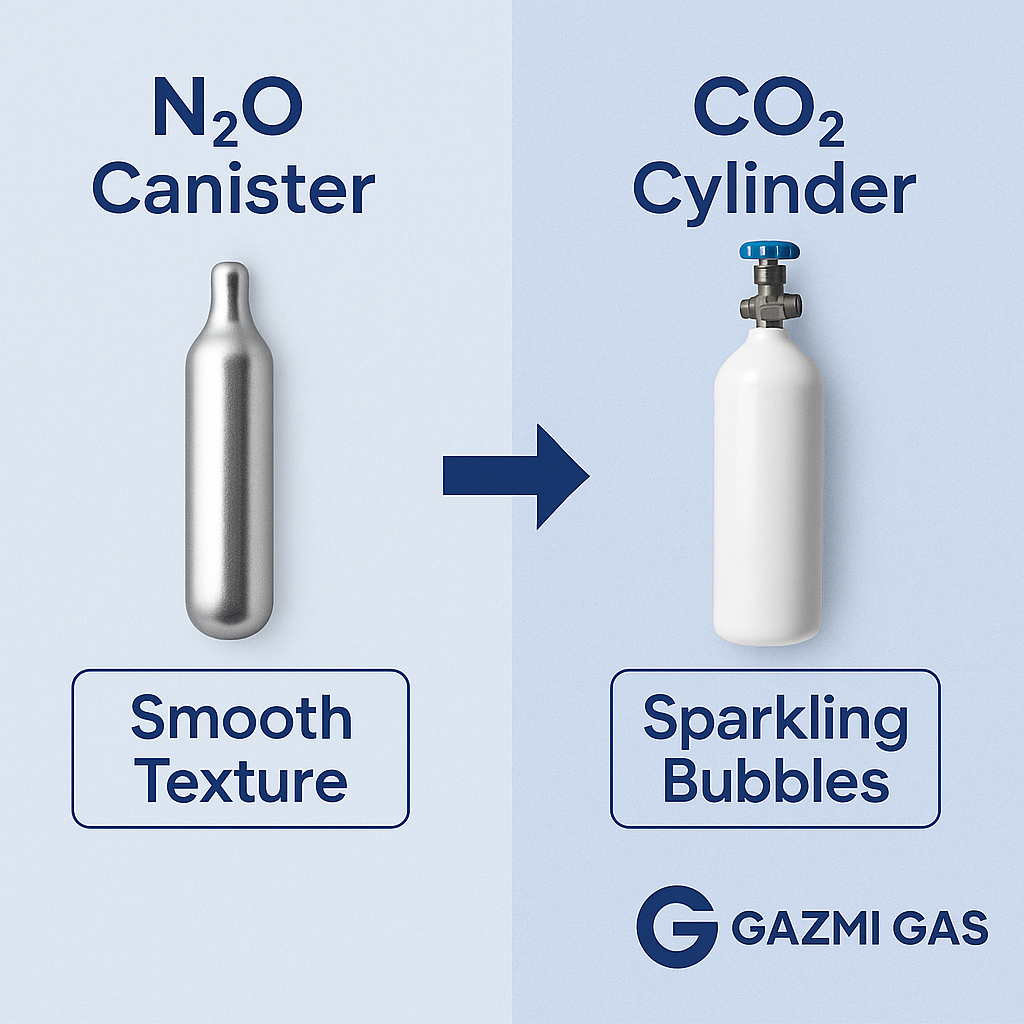
N2O Canister vs. CO2 Cylinder — What’s Different?
Share
By Gazmi Gas · Practical guide for culinary texture and beverage carbonation
TL;DR
- N₂O enhances smooth, stable foams and whipped textures in culinary use.
- CO₂ adds crisp effervescence and a refreshing bite to beverages.
- Use food/beverage-grade gas with compatible regulators; store upright and follow local safety guidance.
Quick Comparison
| Aspect | N₂O Canister | CO₂ Cylinder |
|---|---|---|
| Primary Use | Culinary foams, whipped cream, modern gastronomy | Carbonation for sparkling water, beer, soft drinks |
| Sensory Impact | Smooth, creamy mouthfeel | Crisp bubbles, light acidity |
| Typical Container | Small portable canisters; cream whippers | Small–large cylinders; beverage systems |
| Key Accessories | Food-grade chargers, compatible puncture heads | Regulators, pressure-rated hoses, carbonation stones/taps |
| Recommended Grade | Food-grade for culinary use | Beverage-grade for carbonation |
| Not Interchangeable | Optimized for texture, not carbonation | Optimized for carbonation, not foam stability |
Use Cases & Performance — N₂O
Nitrous Oxide (N₂O) dissolves well in fat-containing matrices and helps produce airy yet stable foams. It’s the go-to for whipped toppings, dessert espumas, and creative texture work where silkiness matters.
Use Cases & Performance — CO₂
Carbon Dioxide (CO₂) dissolves readily in water; when pressure drops, it releases bubbles that create refreshing sparkle and a subtle acidity that brightens flavor. Ideal for seltzer programs and draft beverage systems.
Equipment & Safety
- Match the gas to compatible regulators/whippers; verify thread types and pressure ratings.
- Use certified food/beverage-grade cylinders and components for consumption-related applications.
- Store and transport cylinders upright; keep away from heat; follow local rules and manufacturer guidance.
Explore, Save & Shop
Embed Facebook Post
FAQs
Can I swap N₂O and CO₂?
No. N₂O is tuned for creamy textures, whereas CO₂ is for carbonation.
Do I need food/beverage-grade gas?
Yes—use food/beverage-grade cylinders and components for consumption-related applications.
Any storage best practices?
Store upright, secure during use/transport, keep away from heat, and follow local guidance.
Pinterest Assets
Alt Text (FB Image): Digital comparison of an N₂O canister and a CO₂ cylinder. The N₂O canister is labeled “Smooth Texture” while the CO₂ cylinder is labeled “Sparkling Bubbles”. Gazmi Gas logo appears at the bottom.
Alt Text (Pinterest Image): Vertical infographic comparing N₂O canister and CO₂ cylinder. Left side shows N₂O with “Smooth Texture”, right side shows CO₂ with “Sparkling Bubbles”, Gazmi Gas logo at the bottom.
Pin Title: N₂O Canister vs. CO₂ Cylinder – Key Differences Explained | Gazmi Gas
Pin Description: Discover the essential differences between nitrous oxide (N₂O) canisters and carbon dioxide (CO₂) cylinders. Learn how N₂O creates smooth, creamy textures for culinary use, while CO₂ delivers sparkling bubbles for beverages. Gazmi Gas provides high-quality, reliable gas solutions for professionals and enthusiasts alike. Perfect for foodies, beverage lovers, and industry experts.
